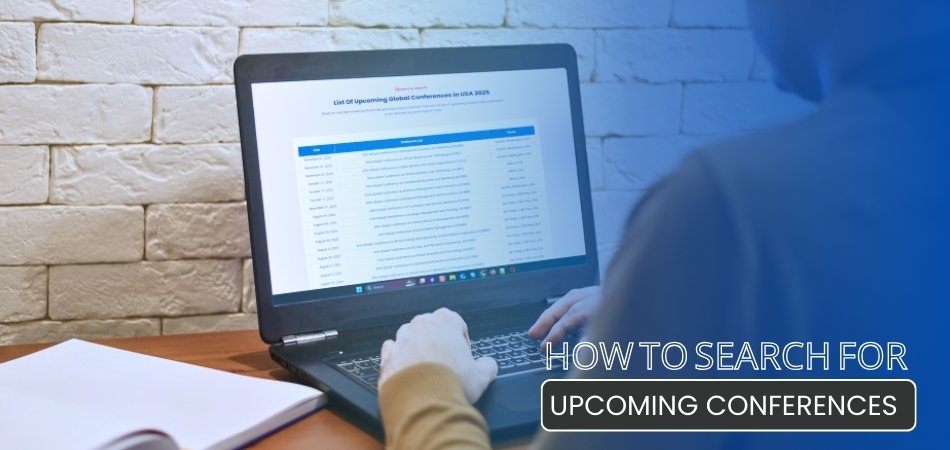You can learn, connect, and grow in your field by attending conferences. The right conference can make all the difference, no matter if you are looking to gain insight from industry leaders, network with professionals, or keep up with the latest trends. Having trouble finding how to search for upcoming conferences to attend?
Finding the best conferences requires knowing where to look. Reliable listing websites like the Global Conference Alliance, social media, professional networks, and search strategies can help find valuable opportunities. University event pages, newsletters, and specialized event apps also provide up-to-date conference details. By using the right resources, you can easily discover events that align with your interests, industry, and career goals.
Are you curious about the best ways to find conferences? In this article, you’ll find everything you need to know to search for and attend the most relevant conferences. Keep reading to explore all the essential strategies and tips for finding great events effortlessly.
How to Search for Upcoming Conferences to Attend in 2025?
Finding the right conferences can be invaluable for professional growth. With so many events happening worldwide, knowing where to look makes all the difference. Whether you seek networking, learning, or industry updates, strategic searching is essential. Here’s how to discover valuable conferences that align with your goals. A well-planned search increases your chances of finding the perfect event.

Explore Reliable Conference Listing Websites
Dedicated platforms provide curated lists of conferences across industries. Websites like Global Conference Alliance Inc. and Eventbrite help professionals find relevant events quickly. These platforms allow users to filter by location, date, and category, ensuring precise results. Searching for upcoming conferences in Canada & USA on these sites offers access to numerous well-organized options. Many listing sites also provide details about keynote speakers and registration deadlines.
Use Social Media for Event Discovery
Social platforms serve as excellent tools for conference research. LinkedIn, Twitter, and Facebook frequently feature industry-specific events through pages, groups, and hashtags. Engaging with professional communities helps uncover valuable opportunities. Many conference organizers also use these channels for announcements and early-bird registrations. Following event pages keeps you informed about last-minute updates and networking sessions.
Utilize Professional Associations and Networks
Industry organizations often host or endorse key conferences. Being a member of such associations grants direct access to exclusive event listings. Many professionals rely on newsletters and networking groups to stay informed. Attending association-backed conferences ensures credibility and high-quality discussions. Membership benefits sometimes include discounted or priority access to major events.
Search Through Academic and Research Institutions
Universities and research centers frequently organize conferences across various disciplines. Their official websites list upcoming academic and professional gatherings. Researchers and scholars can also find calls for papers and panel discussions. Exploring university event pages is particularly useful for those seeking specialized knowledge-sharing opportunities. Many academic conferences also offer grants or sponsorship opportunities for attendees.
Subscribe to Newsletters
Signing up for event notifications saves time and effort. Many platforms offer personalized alerts based on interests and location. Regular updates ensure professionals never miss an important event in their field. Subscribing to multiple sources provides a broad spectrum of relevant conference options. Setting up notifications for new listings ensures instant access to the latest announcements.
Utilize Google With Targeted Search Strategies
A well-crafted search query can yield precise results. Using keywords like “best marketing conferences 2025” or “AI summit near me” refines searches. Google’s advanced filters, including time-based sorting, improve accuracy. Exploring the “News” and “Events” tabs can also reveal newly announced conferences. Checking the official websites of past conferences can help find upcoming editions.
Follow Influencers and Thought Leaders
Experts in various industries often share conference recommendations. Following speakers, authors, and influencers provide insights into top-tier events. Many professionals highlight must-attend conferences based on their experience. Engaging with their content leads to discovering valuable networking opportunities. Watching their conference recaps can also help determine if an event is worth attending.
Are Social Media Channels Useful for Finding Conferences?
Social media is more than just a space for networking; it’s a powerful tool for discovering industry events. Many professionals rely on platforms like LinkedIn, Twitter, and Facebook to stay updated on conferences worldwide. Organizers frequently promote events through social channels, making them an essential resource. Let’s see how they help in finding conferences in your field.
Follow Industry Leaders and Influencers
Experts and thought leaders often share updates about upcoming conferences. Their posts may include event details, speaker lineups, and registration deadlines. Engaging with their content allows professionals to stay informed about high-quality events. Keeping an eye on industry influencers ensures you never miss an important opportunity.
Join Professional Groups and Communities
Many industries have dedicated social media groups for event discussions. These groups often provide insider recommendations, early announcements, and registration discounts. Engaging in these communities allows professionals to exchange information about relevant conferences. Being an active member helps you build connections and discover exclusive events.
Use Hashtags to Track Conference Announcements
Social media hashtags make it easy to search for upcoming events. Many conferences use specific hashtags for promotions, updates, and discussions. Searching industry-related tags can help in finding academic conferences and professional gatherings. Following trending hashtags ensures real-time access to event information.
Check Official Conference Pages and Accounts
Many conferences maintain dedicated social media pages. These pages provide event schedules, keynote speaker details, and important updates. Following official accounts ensures that you receive timely notifications about upcoming events. Engaging with these pages also helps in connecting with fellow attendees before the event.
Explore Event Listings on LinkedIn
LinkedIn features a dedicated events section where professionals can discover relevant conferences. Many organizers create LinkedIn events with full details, including speakers and registration links. Engaging with these listings helps professionals find industry-specific gatherings. Connecting with event hosts or attendees can further increase networking opportunities.
Follow University and Research Institution Pages
Academic institutions frequently announce their events through social media. Many universities share details about research conferences, symposiums, and workshops. Following their pages helps researchers and scholars stay updated on academic gatherings. Engaging with these institutions ensures access to high-quality educational events.
Watch Live Sessions and Pre-Event Discussions
Many conferences host live Q&A sessions or panel discussions before the main event. These sessions provide insights into the topics covered and help attendees decide if an event is valuable. Watching live discussions also allows professionals to interact with speakers. Engaging with pre-event content improves the overall conference experience.
How to Identify the Right Conference for Your Needs?
Attending a conference can be a valuable experience, but choosing the right one matters. The right event should align with your professional goals, interests, and learning objectives. With so many options available, narrowing down the best conference requires careful consideration. By evaluating key factors, you can ensure a productive and rewarding experience.
Define Your Goals and Expectations
Knowing about your objectives helps in selecting a conference that adds value. Whether you aim to expand your knowledge, build connections, or present research, clarity is essential. Identifying what you hope to gain from the event ensures a purposeful decision. A well-defined goal makes the selection process easier and more effective.
Research the Conference Reputation
A well-established conference often provides high-quality discussions and networking opportunities. Checking past editions, attendee reviews, and speaker lineups helps assess credibility. Recognized industry events usually attract top experts and thought leaders. A strong reputation ensures that the conference meets professional and academic standards.
Evaluate the Speaker and Panel Lineup
Speakers play a significant role in the quality of a conference. Reviewing the list of keynote speakers and panelists helps determine if the event aligns with your interests. Experts and industry leaders provide valuable insights that increase learning. A strong lineup ensures engaging discussions and relevant takeaways.
Consider the Conference Format and Structure
Different conferences offer varying formats, including workshops, keynote sessions, and networking events. Choosing the right structure ensures a fulfilling experience. Some events focus on academic presentations, while others emphasize industry applications. If you’re from an academic field, knowledge of the format helps in selecting the right academic conference that aligns with your needs.
Check the Target Audience and Networking Potential
Conferences target different professional levels and industries. Ensuring the audience matches your field elevates networking opportunities. Engaging with like-minded professionals advances valuable connections and discussions. A conference with a relevant audience increases the chances of meaningful interactions.
Compare Costs and Budget Considerations
Attending a conference requires financial planning. Evaluating registration fees, travel expenses, and accommodation costs helps in decision-making. Some events offer early-bird discounts or scholarships to reduce expenses. A well-balanced budget ensures a stress-free experience.
Look at Past Conference Success
Examining past event records provides insights into the conference’s quality. Reviewing previous programs, speaker feedback, and participant experiences offers a clear picture. A well-organized and successful event ensures a worthwhile investment of time and resources. Checking consistency in quality helps in making an informed choice.
Should You Attend Industry-Specific or Multi-Disciplinary Conferences?
Each conference offers distinct advantages, depending on your career goals and learning preferences. Industry-specific conferences are fitted to a single field, while multi-disciplinary events bring together diverse topics and audiences. Assessing the differences can help you make a more informed decision that aligns with your needs.
Focus on Expertise and Depth
Industry-specific conferences dive deep into niche topics. These events often feature experts who provide specialized knowledge and insights. If you are looking to deepen your knowledge of a particular subject, such events are invaluable. Attending these conferences allows you to stay ahead of trends and innovations within your industry.
Broader Learning and Cross-Industry Networking
Multi-disciplinary conferences provide a broader perspective by covering various topics and industries. These events allow you to gain insights into fields outside of your immediate expertise. Connecting with professionals from different sectors can spark innovative ideas and collaborations. Attending a multi-disciplinary conference broadens your horizons and promotes interdisciplinary knowledge.
Targeted Career Growth or Diverse Opportunities
If you are focused on advancing your career within a specific industry, attending an industry-specific conference can offer targeted growth. These events connect you with like-minded professionals and help you stay updated on the latest industry trends. On the other hand, multi-disciplinary conferences offer exposure to a variety of career paths and opportunities for collaboration across industries.
Networking With a Specialized or Varied Group
Networking opportunities vary depending on the type of conference. At an industry-specific conference, you’ll meet professionals with similar backgrounds, which can help in building a solid network within your field. In contrast, multi-disciplinary conferences allow you to interact with people from diverse fields, supporting creative collaborations. Depending on your career goals, one type of networking may be more beneficial than the other.
Attending for Knowledge Depth or Breadth
If your primary goal is to gain deep, technical knowledge in a single field, an industry-specific conference is likely the better choice. These events focus on advanced topics and provide detailed insights. Alternatively, if you wish to understand broader trends, innovations, or interdisciplinary approaches, multi-disciplinary conferences offer a wider scope of learning.
Frequently Asked Questions
Here are some commonly asked questions about searching for upcoming conferences to attend. These answers will help you complete the process and make informed decisions when selecting the right conferences for your needs.
How Can I Find Conferences in a Specific Location?
To find conferences in a specific location, use event listing websites that offer location filters. You can also search social media platforms using location-based hashtags. Professional networks, such as LinkedIn, can also provide localized conference recommendations and updates. Additionally, many industry-specific organizations list conferences by region on their websites.
Can I Get Discounted Tickets for Conferences?
Many conferences offer discounts, especially for early registration or group attendance. Additionally, students and members of certain professional organizations often receive special rates. Subscribing to conference newsletters or following event pages on social media can help you stay updated on promotional offers and discount codes.
How Do I Know if a Conference Is Worth Attending?
Before attending a conference, review its agenda, speaker list, and past attendee feedback. Look for conferences that offer relevant topics, reputable speakers, and networking opportunities. Research the event’s reputation and check for reviews on independent platforms to assess its value. Ensure that the conference aligns with your professional goals.
What Is the Best Time to Register for a Conference?
It’s best to register for a conference as early as possible to secure a spot and access early-bird pricing. Most conferences open registration several months before the event. Signing up early also helps with travel and accommodation planning, as well as ensures you don’t miss out on workshops or special sessions.
Are Virtual Conferences as Beneficial as In-Person Ones?
Virtual conferences have become increasingly popular and offer many of the same benefits as in-person events, such as access to expert speakers, networking opportunities, and valuable resources. However, in-person events provide the added advantage of face-to-face interaction and deeper networking. Whether virtual or in-person, choose based on your personal preferences and goals.
How Do I Stay Updated on Future Conferences?
To stay updated, subscribe to industry newsletters, join relevant professional groups on social media, and set up Google Alerts for specific topics. Many event listing websites also offer email notifications when new conferences are added. Regularly checking trusted platforms ensures you’re always informed about upcoming events.
Should I Attend International Conferences?
Attending international conferences can offer exposure to global trends, networking with international professionals, and gaining new perspectives. However, it’s important to consider travel costs, visa requirements, and the conference’s relevance to your field. International events are especially beneficial for those looking to expand their global network or learn about international markets.
How Do I Know Which Conferences Are Best for Networking?
To identify conferences with strong networking opportunities, look at the event’s agenda and attendee profiles. Conferences offering workshops, networking sessions, and social events tend to provide more chances for connecting with professionals. Checking the conference’s website for previous attendee testimonials can also reveal networking success stories.
Can I Present at a Conference Without Being an Expert?
Yes, many conferences offer opportunities for rising professionals to present. Some conferences have tracks for beginners or novice speakers, such as poster sessions or workshops. Look for calls for papers or presentation proposals that specifically encourage newcomers to share their work or ideas.
What Should I Do After Registering for a Conference?
After registering, take the time to review the event schedule and identify key sessions that align with your interests. Make travel and accommodation arrangements early, especially if the conference is in person. Also, connect with other attendees through networking platforms or social media to build relationships before the event begins.
How Do I Find Niche Conferences for My Field?
To find niche conferences, start by exploring specialized industry associations or online communities. Many organizations host exclusive conferences for specific fields or areas of expertise. You can also search for events using keywords related to your specific area of interest on event listing platforms. These resources help you discover conferences customized to niche topics.
Final Thought
Stepping into a conference hall filled with professionals, innovators, and thought leaders can be a turning point in your career. These events offer a platform to exchange ideas, gain industry insights, and establish valuable connections. But with so many options available, finding the right conference requires a strategic approach to ensure a meaningful experience.
If you’re still asking how to search for upcoming conferences to attend?, the answer lies in using multiple resources. Trusted event listing websites, social media, academic institutions, and professional associations are great places to start. Subscribing to newsletters and setting up alerts also help you stay updated. With these strategies, you can easily find and register for the best conferences without missing any important events.







